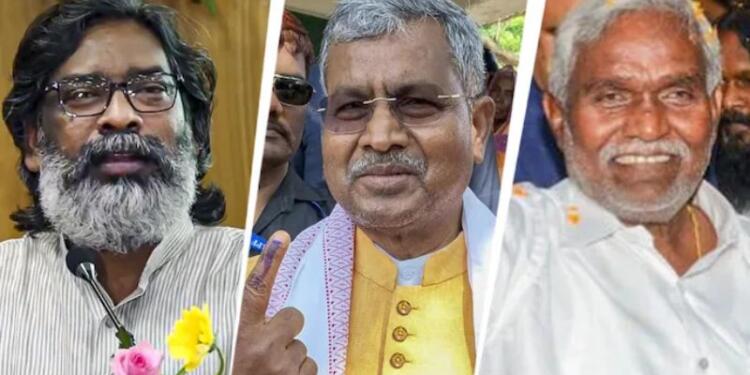The assembly election results in Maharashtra and Jharkhand have deviated from the usual trend of a ‘revolving door’ governance cycle, with incumbents in both states making a resounding comeback. The victories and lead trends indicate an over two-thirds majority for the incumbent alliance.
On one hand where the Bharatiya Janata Party-led Mahayuti is heading towards a landslide victory in Maharashtra, Jharkhand has come up as a big setback for the saffron party.
Going by the current trend, which is most likely to persist, the NDA has limited itself to only 21 seats out of 81 in Jharkhand. BJP’s underperformance can be attributed to several underlying reasons, chief among them being its failure to mount a strong challenge against the Jharkhand Mukti Morcha-led I.N.D.I.A. alliance, which successfully consolidated tribal and Muslim support.
Unraveling the factors
Illegal Infiltration has been a major issue prevalent in the state of Jharkhand and it seemed that it had the potential to influence Jharkhand’s Assembly election. Highlighting the concern of demographic change, the BJP based its campaign pitch on the ‘Roti, Beti, Mati’ slogan. Be it the party’s election in-charge Himanta Biswa Sarma, Home Minister Amit Shah, or Prime Minister Narendra Modi, all raised the same concerns in their campaigns in Jharkhand. They also promised to come up with laws and measures for the same if voted to power.
The loss in Jharkhand is deeply painful for me personally, even though we secured victory in all five by-elections in Assam. I have witnessed the unwavering dedication and relentless efforts of our Karyakartas in Jharkhand, who gave their all in this election. We fought with a…
— Himanta Biswa Sarma (@himantabiswa) November 23, 2024
With 26 percent of the state’s total population as per 2011 census, tribals have always played a pivotal role in deciding the state’s political future where the Jharkhand Mukti Morcha (JMM) maintains a stronghold owing to the legacy of Shibu Soren, father of Hemant Soren and a prominent tribal leader and architect of Jharkhand’s separation from Bihar. Despite efforts like appointing tribal leaders in high posts and electing Draupadi Murmu as India’s President, BJP couldn’t galvanise the tribals and dent the JMM’s vote bank.
While the JMM built a narrative around Hemant Soren’s jail term in a land scam case, portraying him as a victim to garner sympathy votes, especially among the tribals, BJP’s tribal leader Babulal Marandi and Champai Soren’s defection over his unceremonious ouster from CM-post by Hemant Soren failed to overshadow JMM’s appeal within the tribal community.
The saffron party this time saw the issue of illegal infiltration as a volley to get hold of the tribal votes, particularly in Santhal Pargana who form a strong vote bank of the Jharkhand Mukti Morcha led by Hemant Soren. However it seems that the infiltration and demographic concerns could not get the concern converted to votes. While the issue resonates locally, the NDA lacked a strong cadre to mobilize voters in the areas affected by the demographic shift.
While slogans promoting Hindu unity, such as “Batenge toh Katenge” and “Ek hai toh safe hai,” resonated effectively in Maharashtra, they failed to secure votes for the BJP in Jharkhand. The state’s diverse voter demographics diluted the impact of such emotionally charged narratives.
BJP fought the 2024 Jharkhand Assembly election with the All Jharkhand Students Union Party (AJSUP) as their primary alliance whom it trusted to bring along with it a decent share of the vote bank and some seats but the alliance partner could only manage to get hold of 1 seat which gave a major hit to the NDA. AJSUP headed by Sudesh Mahto is considered to be a party that has a stronghold among the Kudmi community which makes up a decent percentage of the state’s total population that is 15 percent but with Jairam Mahto, the leader of the Jharkhand Loktantrik Krantikari Morcha (JLKM) coming to prominence, AJSUP seems to be facing a major challenge to hold up on its Kudmi voter bank.
In regions like the North Chotanagpur division, Jairam Mahato, leader of the Jharkhand Loktantrik Krantikari Morcha (JLKM), has gained traction with his “locals vs. outsiders” narrative. This has distanced many Mahto community voters from the BJP and its ally, AJSUP. Sudesh Mahto, the AJSUP Chief is now seen as disconnected from grassroots realities and thus trailing in the Silli constituency.
Last-minute welfare schemes/freebies thrown by the incumbent JMM Government like the Maiyya Samman Yojana that provides financial assistance of Rs 1000 every month to women, turned the tides against the BJP and its allies. The I.N.D.I. Alliance also consolidated its hold over the South Chotanagpur division, home to a large Christian population.
Demographics too played a crucial role in shifting the election results away from the saffron party. I.N.D.I. alliance with its grand old strategy of minority appeasement has again successfully managed to fetch the minority votes. Christians and Muslim communities in the state have overwhelmingly favored the JMM-Congress Alliance.

























